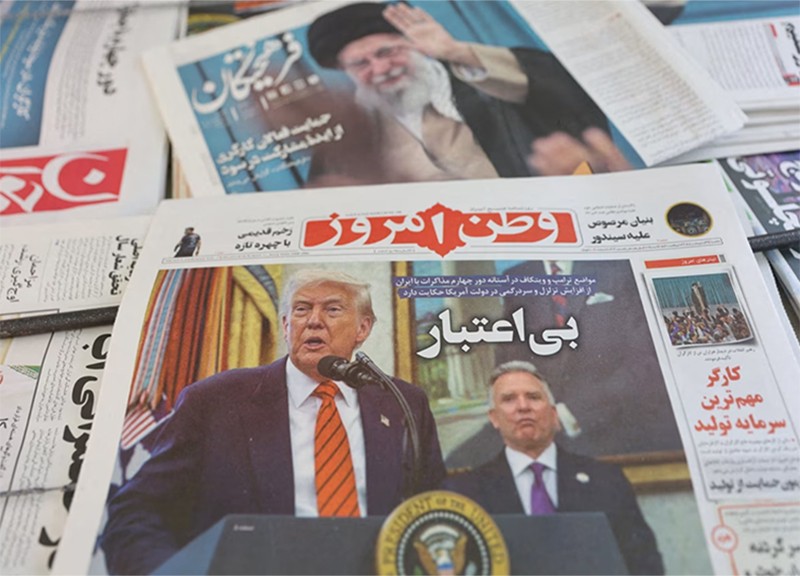
The ayatollahs drag out the nuclear talks because they’re no longer scared of the American president.
By Reuel Marc Gerecht and Ray Takeyh. WSJ.
The nuclear negotiations be-tween Iran and the U.S. appear to be at an impasse. The temptation for President Trump will be to declare victory and pocket a status quo in which Tehran refrains from testing a nuke. The White House may even find comfort in a question senior officials in the Biden administration asked themselves: Why hasn't Iran already gone nuclear?
The Trump administration entered negotiations without clear positions on crucial issues, surprising and cheering the Iranian side. But Tehran's happiness was short-lived. Negotiators Steve Witkoff and Secretary of State Marco Rubio subsequently declared that uranium enrichment in Iran is unacceptable. Iran's supreme leader, Ali Khamenei, hasn't broken off talks, indicating hope that Mr. Trump will change his mind or won't preclude an interim deal that allows domestic enrichment.
Tehran's diplomatic maneuvering and prevarication is incessant. If Mr. Trump grows tired of it, he could give Israel the green-light to knock out Iran's nuclear infrastructure and ballistic-missile plants. This option doesn't appeal to him as it requires a U.S. military backstop. More appealing to Mr. Trump is to continue talking, discourage Israeli military action, and default to "maximum pressure." He wouldn't mind punting troublesome issues into the future. He may hope sanctions and whatever else his administration can muster will eventually bring Tehran around. This option will unavoidably reanimate the question of why the clerical regime hasn't already gone nuclear.
The Islamic Republic doesn't have the best nuclear engineers, and Iranian manufacturing is hardly first-rate. But Iran does have a sophisticated, illicit dual-use import network, and its talent base is as good as Pakistan's when Islamabad went nuclear in 1998. Iran's stockpile of highly enriched uranium grew enormously from 2021-25, yet Mr. Khamenei chose not to test an atomic device during the Biden administration.
Mr. Trump may know that round two of maximum pressure has poor odds of stopping Iranian nuclear progress. Sanctions have always been the preferred choice of both parties in Washington. During the first Trump administration it was widely believed that economic pressure could crack the clerical regime before it went nuclear. Amping up sanctions on the Islamic Republic now will be much more difficult, in part because Beijing has moved squarely into Tehran's corner. Sanctions aren't a quick-fix policy solution. To work, they take time. The Iranian atomic-arms program is more advanced now than it has ever been.
Iran won't be content to remain a nuclear threshold state forever. In the past the mullahs could project power via proxy warfare or the threat of long-range ballistic missiles. Now, thanks to the Israelis, they don't even have an adequate homeland defense. Mr. Khamenei is 86. Will his successor also choose not to test a nuke? What about the Revolutionary Guard Corps com-manders who oversee Iran's nuclear arms program? With America retrenching globally, friend and foe alike will want the security of a bomb.
Fear of foreign enemies fades quickly in the Muslim Middle East, where internal and external politics revolve around hard power. Aggressive men keep probing. Five months into Mr. Trump's second term, the mullahs are no longer afraid of the unpredictable American president who killed Qasem Soleimani in 2020. "In matters such as the purchase of Gaza and Greenland, the imposition of new tariffs, and even negotiations related to the Ukraine War, Trump first applied maximum pressure, but ultimately left room for retreat," is the assessment of Nournews, the mouthpiece for Iran's national secu-rity council.
The Trump administration has convinced many in Tehran that the president doesn't want another conflict in the region. His threats of fire and fury are becoming more recognizably Middle Eastern-words substitute for actions. Given all the advanced centrifuges and the ever-deeper bomb-proof underground enrichment sites, the military option is becoming less credible. For Israel, it's now or never. The U.S. has patience with threats that are existential only to its allies.
Mr. Khamenei will consider all this as he contemplates the most serious decision of his tenure: whether finally to cross the nuclear threshold. How scary does he think America is under Mr. Trump? Everything hinges on the answer to that question.
Mr. Gerecht is a resident scholar at the Foundation for the Defense of Democracies. Mr. Takeyh is a senior fellow at the Council on Foreign Relations.














